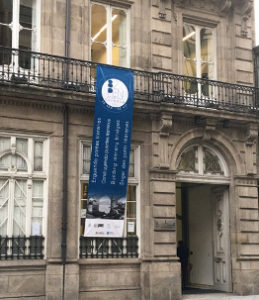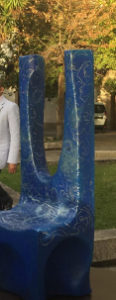Posts Tagged ‘Spain’
New Day…
I watched the sun rise this morning, the ducks swimming by south to north, the geese flying overhead north to south, the light spreading across the river—first a red strip, then orange…pink…a yellow ball peeking through the grove of trees across the water, then ascending the treetops…a golden globe heralding the day.
The river flows steadily towards an open expanse into the Chesapeake and ultimately into the Atlantic Ocean. It has been a mild winter so far, no ice on the water, just an occasional dusting of frost on the ground which melts with the sun.
On a flagpole by the river the American flag ripples in the breeze as the geese flap by. My dogs—one blonde, one black, both part Labrador and other breeds, wander along the river front, finding their smells and place to rest and watch the day unfold.
It is a new day…with a new government in my home city of Washington, DC. Today I look backward and forward at the same time. I am not the only one contemplating past and future, past as prologue? I share here two earlier posts, one from January 2009 after the inauguration of Barack Obama “When the Crowds Go Home, Ideas Keep Traveling.” Much has happened in the intervening twelve years. The other is October 2012, “A Visit to the End of the World” written from the edge of where the ancients thought the world ended, in Finisterre, Spain. Only a wide and empty Atlantic Ocean stretched before them. It was necessary to imagine…
How these connect I leave to another post and look forward to hearing from others.
(Photo credits: Joanne Leedom-Ackerman)

When the Crowds Go Home, Ideas Keep Traveling
(January, 2009)
The crowds have left; the reviewing stands, disassembled. The reflecting pool is frozen with sea gulls light-footing across it. Washington, DC has held its grand party. For three days, everyone was on foot, bundled in coats, scarves, gloves and walking everywhere–to the Mall, to the Capitol, to the White House (or as close as one could get), peering over barricades, hundreds of thousands of people.
Most of those who came to town have returned to all the states in the union from which they came. Those from the more than 100 foreign countries here to watch the Inauguration have also returned. As the full working week commenced in Washington, snowflakes were falling; the sky was cloudy, and the Potomac River, crusted with ice at the edges, waited for spring.
But the spirit remained. And the consequences of this global gathering were only beginning. Among those visiting Washington were women from the world’s conflict regions, women engaged in peace building, who were gathered to share experiences and also to study and watch the U.S. electoral process, particularly as it might apply to their circumstances and lives….[cont]
A Visit to the End of the World
(October, 2012)
I visited the end of the world this week, at least the spot on the earth where the ancient Romans believed the sun left the earth and the known world ended. The AC 552 highway takes you there in four lanes with possible detours through charming fishing villages along the coast of Galicia. If you stand on the granite cliffs of Finisterre, Spain looking west, you see the billowing Atlantic and can understand the Roman’s perspective for nothing lays beyond, at least nothing one could see or travel to in the ships of their day.
The Romans called the spot the Cape of Death since the sun died there. It was also a place of numerous ship wrecks on the jagged rocks reaching out in a finger hook into the sea before a light house was built centuries later. The Greeks had denominated another spot on the earth, Mount Hacho in Spanish Morocco, as the place where the world ended because that was as far as their eyes could see….[cont]
Building Literary Bridges: Past and Present
Gathered in the ancient city of Ourense, Spain in the heart of Galicia, writers from around the world celebrated history, debated the present and committed to the future of literature and freedom of expression at PEN International’s 82nd Congress organized around the theme “Building Literary Bridges.”


Two hundred poets, novelists, dramatists and nonfiction writers from approximately 75 centers of PEN agreed to embark on a three-year global campaign to increase opportunities for displaced writers worldwide. Responding to the unprecedented flow of refugees, migrants, and displaced, all of which include writers and those whose stories need to be told, the 95-year old literary organization will undertake an initiative to put storytelling and literature at the center of an effort to heal and expand opportunities. Through its 145 centers, PEN will develop programs that will include residencies, workshops, mentoring, education and publications. The full scope of the campaign will be announced December 10, Human Rights Day.
Founded in 1921 out of the chaos and refugee flows after World War I, PEN anticipated and protested the suppression of freedom of expression in Nazi Germany prior to World War II and defended writers throughout Europe during the war, offering haven and setting up PEN centers in exile.
“PEN responds to the crises of our times,” said PEN International President Jennifer Clement. “We are writers. We believe in imagination.”
The 82nd Congress began with heartening and dispiriting news. Iranian-Canadian writer Homa Hoodfar was released from Iran’s Evin prison at the same time news arrived that Jordanian columnist Nahed Hattar had been gunned down outside court by a fundamentalist who claimed Nahed deserved to die for his ideas.
This pattern of good and terrible news also emerged in the past year with early releases of imprisoned writers in Tibet, Kazakhstan, Azerbaijan, Vietnam, Qatar and Colombia at the same time the situation deteriorated with more arrests and killings in Bangladesh, China, Turkey, Ukraine and other countries.
The tradition of an Empty Chair at the PEN Congress sessions highlighted the cases of imprisoned Egyptian novelist Ahmed Naji, Kurdish journalist Asli Erdogan, Palestinian poet Dareen Tatour, and Gui Minhai, a bookseller in Hong Kong, who was kidnapped by the Chinese government while he was in Thailand.
Gui’s daughter, a Swedish citizen as is he, sent a letter to the Congress: “In the end, this is not about my father as an individual…. This is about China actively extending its control far beyond its own borders. This is about China kidnapping and illegally detaining more and more people because of their political beliefs. It’s about European citizens no longer being able to know that their human rights will be protected.”
Discussing “Literature as a Tool for Empowerment,” delegates shared ongoing projects, including working with young writers in schools and in prisons. Lebanon PEN Center’s delegate noted, “I discovered the tremendous effect from creative writing to express trauma and help people tell their stories. We have 1.3 million Syrians in Lebanon. We have a big responsibility. We see the empowerment of civil society through literature.”
In Mali and Sierra Leone, the PEN centers work with students and young people in post-conflict situations. The Mali delegate spoke about workshops with Tuareg warriors who had fought on the battlefield in the Sahara. When they returned home, they had lost their dignity and positions and were migrants so they went to join the ranks of Gadhafi. After Gadhafi was toppled, there was a big problem, he said, and conflict. The Mali PEN Center helped organize writing workshops which led to publishing books. Hundreds attended these workshops and were able to tell their stories and see them published.
PEN’s earliest work to protect writers began when poet Federico Garcia Lorca was arrested at the beginning of the Spanish Civil War in 1936. PEN President H.G. Wells sent a telegram protesting, but it arrived too late and Lorca was executed. At the 82nd PEN Congress, Lorca’s niece Laura opened the Assembly with Lorca’s poem Sonnet:
I know that my profile will be serene
In the north of an unreflecting sky.
Mercury of vigil, chaste mirror
to break the pulse of my style.
For if ivy and the cool of linen
are the norm of the body I leave behind,
my profile in the sand will be the old
unblushing silence of a crocodile.
And though my tongue of frozen doves
will never taste of flame,
only of empty broom,
I’ll be a free sign of oppressed norms
on the neck of the stiff branch
and in an ache of dahlias without end.
–Federico Garcia Lorca